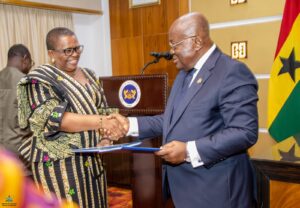adverts
The President of Ghana, Nana Addo Dankwa Akufo-Addo, has signed a landmark Presidential Compact on Water and Sanitation, reinforcing the government’s commitment to improving public health, boosting climate resilience, and providing access to water, sanitation, and hygiene (WASH) services for remote communities.
This Presidential Compact, the third of its kind in Africa, commits the Ghanaian government to allocate approximately $1.7 billion annually to WASH initiatives until 2030. The funding will ensure that schools, healthcare facilities, and hard-to-reach communities have sustainable access to essential WASH services.

adverts
During the signing ceremony, President Akufo-Addo stated, “The journey on which we are embarking is built on the fundamental truth that without WASH services, sustainable development will remain an elusive dream. This Compact represents not the start but the continuation and amplification of our efforts; a decisive step to ensure that every citizen, irrespective of their location or circumstance, enjoys sustainable access to these vital services.”
Hon. Lydia Seyram Alhassan, Ghana’s Minister for Sanitation and Water Resources, emphasised the significance of the Compact, saying, “The Compact, signed by the President of the Republic, shows how seriously we as a country take WASH issues.”
She highlighted that the Compact came to fruition just one year after it was announced as a commitment at the UN 2023 Water Conference.
The Presidential Compact will lead to the establishment of a National Sanitation Authority, aimed at eradicating open defecation in Ghana by 2030.
Additionally, Ghana’s national climate strategy will now incorporate the development of climate-resilient water and sanitation infrastructure, preparing the country to better handle the challenges posed by increasing droughts and floods.
The Compact is the result of extensive consultations involving government agencies, development partners, academia, and local civil society organisations.

It is supported by international partners, including the Government of the Netherlands, the UK Foreign, Commonwealth, and Development Office, UNICEF, the Sanitation and Water for All partnership, and IRC WASH.
These partners will provide advisory support, technical expertise, and coordinated advocacy for the implementation of the Compact.

With this historic initiative, Ghana sets a powerful example for other nations in the global effort to achieve universal access to water, sanitation, and hygiene, underscoring the importance of sustainable development for all.


